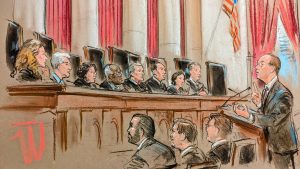It has been nearly 40 years since the Supreme Court indicated in Chevron v. Natural Resources Defense Council that courts should defer to an agency’s reasonable interpretation of an ambiguous statute. After more than three-and-a-half hours of oral argument on Wednesday, it seemed unlikely that the rule outlined in that case, known as the Chevron doctrine, will survive in its current form. A majority of the justices seemed ready to jettison the doctrine or at the very least significantly limit it.
The court’s ruling could have ripple effects across the federal government, where agencies frequently use highly trained experts to interpret and implement federal laws. Although the doctrine was relatively noncontroversial when it was first introduced in 1984, in recent years conservatives – including some members of the Supreme Court – have called for it to be overruled.
The plea to overturn the Chevron doctrine came to the court in two cases challenging a rule, issued by the National Marine Fisheries Service, that requires the herring industry to bear the costs of observers on fishing boats. Applying Chevron, both the U.S. Court of Appeals for the District of Columbia Circuit and the U.S. Court of Appeals for the 1st Circuit upheld the rule, finding it to be a reasonable interpretation of federal law.
The fishing companies came to the Supreme Court, asking the justices to weigh in on the rule itself but also to overrule Chevron. Roman Martinez, representing one group of fishing vessels, told the justices that the Chevron doctrine undermines the duty of courts to say what the law is and violates the federal law governing administrative agencies, which similarly requires courts to undertake a fresh review of legal questions. Under the Chevron doctrine, he observed, even if all nine Supreme Court justices agree that the fishing vessels’ interpretation of federal fishing law is better than the NMFS’s interpretation, they would still be required to defer to the agency’s interpretation as long as it was reasonable. Such a result, Martinez concluded, is “not consistent with the rule of law.”
Arguing on behalf of the second group of fishing companies, Paul Clement echoed Martinez’s points. Emphasizing that his clients’ case “well illustrates the real world costs of the Chevron” doctrine for small businesses, he decried the doctrine as “hopeless ambiguous” and “reliance destroying.” The question in this challenge to the rule, he said should focus on what the best reading of the statute is.
Representing the Biden administration, U.S. Solicitor General Elizabeth Prelogar urged the justices to leave the Chevron doctrine in place, telling them that it has “deep roots in this Court’s jurisprudence.” Under the doctrine of stare decisis – the idea that courts should generally adhere to their prior cases – the court would need a “truly extraordinary justification” to overrule it, which the challengers do not have, she asserted.
The court’s three liberal justices expressed support for keeping the doctrine in place. Justice Elena Kagan repeatedly suggested that federal agencies, with their scientific and technical expertise, are better suited than courts to resolve ambiguities in a federal statute.
Kagan cited as one example a hypothetical bill to regulate artificial intelligence. Congress, she said, “knows there are going to be gaps because Congress can hardly see a week in the future.” So it would want people “who actually know about AI and are accountable to the political process to make decisions” about artificial intelligence. Courts, she emphasized, “don’t even know what the questions are about AI,” much less the answers.
Justice Sonia Sotomayor agreed with Kagan. She doubted whether there can be a “best” interpretation of a law when the justices “routinely disagree” about a law’s meaning. The real question, she said, is who makes the choice about what an ambiguous law means. And if the court needs a “tie-breaker,” she continued, why shouldn’t it defer to the agency, with its expertise?
Justice Ketanji Brown Jackson posited that the Chevron doctrine serves an important purpose. Under Chevron, she suggested, Congress gives federal agencies the power to make policy choices – such as filling gaps or defining terms in the statute. But if Chevron is overturned and agencies no longer have that power, she predicted, then courts will have to make those kinds of policy decisions.
But Justice Brett Kavanaugh saw Chevron’s deference to agencies differently. Chevron, he complained, “ushers in shocks to the system every four or eight years when a new administration comes in” and implements “massive change” in areas like securities law, communications law, and environmental law.

No comments:
Post a Comment